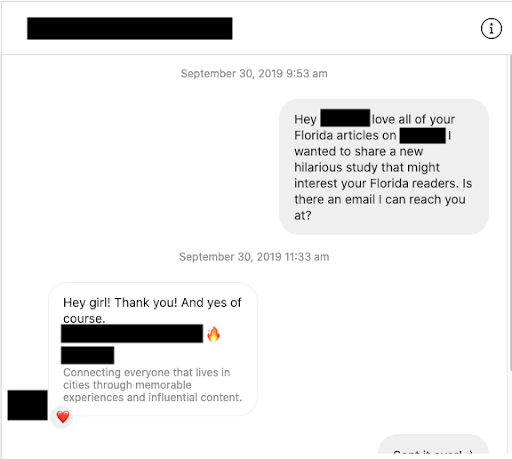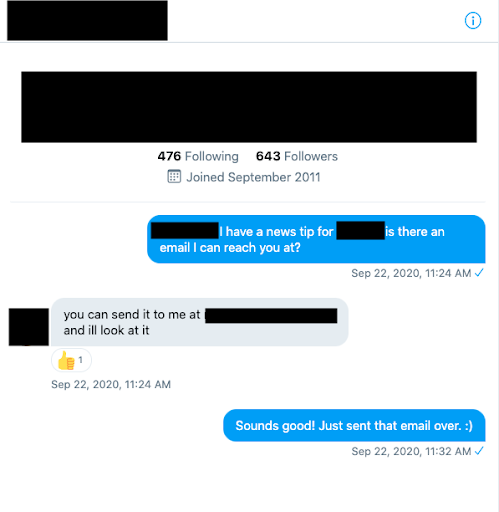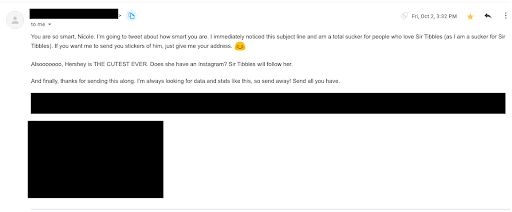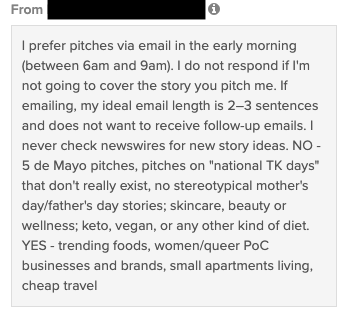30-second summary:
- Social media can provide a personable avenue for starting a connection.
- Keeping connections on social media and emails consistent allows for a solid flow through the construction of a relationship.
- Compliments and details are valuable if used in the correct context in conjunction with a relevant pitch.
- Media Relations Lead Nicole Franco shares personalization tips and tricks on sending both professional and personalized media pitches.
Marketers who strive to build backlinks and brand awareness often engage in digital PR.
But creating amazing content and then pitching that content to writers is not an easy earned media strategy. The outreach alone can cause many marketers to struggle and eventually give up on the tactic.
However, although easier said than done, appealing to the writer away from a regular pitch email can set any market apart from the wave of emails a journalist receives daily.
Read on to discover several ways to not only compose an exceptional media relations email but also how-to create organic, personalized relationships with writers by utilizing social media.
Technique #1: Complimenting via Instagram
One natural way to start a relationship with an editor or journalist is to start the connection via Instagram.
First, add them and maybe like their most recent post. Read the situation, maybe leave a witty comment or compliment on a relevant post relating to the content of a potential pitch.
After a minor connection has been made, send them a message or email regarding their Instagram post while mentioning your content and ideas for a collaboration.
Below is an example of a potential way to reach out to an editor. Keep in mind the content you are pitching and if it’s a serious topic. Editors covering lifestyle topics would be keener on receiving these kinds of requests.
1. Instagram DM

Pitch email

Keeping in mind the kind of journalist you are reaching out to is important. In the example above, the writer had posted about Disney and had consistently covered witty travel content.
Analyzing their coverage and writing style can provide valuable insight into how to properly reach out. Also, noting something that happens in everyday life or mentioning some seasonal holiday plans are great examples of how to personalize a pitch. In the example above, I chose to connect about Halloween costumes via Instagram.
Technique #2: Asking for contact info via Twitter
Similar to Instagram, a great way to connect with journalists is by starting a conversation on Twitter. Instead of liking a photo or leaving a compliment, try retweeting or liking a relatable post.
Twitter DMs are also a great way to ask a publisher for their preferred form of contact. Many publishers have open DMs and are willing to accept a news tip right in their Twitter inbox!
Twitter DM

Pitch email


Pitch Response

One of the most important things to note when reaching out on social media is making sure the content you’re pitching is relevant. This connection worked because the marketer did their research and took the writer’s beat into consideration and referenced a recent article they had covered in the pitch email.
If your content is not relevant or doesn’t align with the writer’s coverage, don’t expect a response.
Technique #3: Get acquainted on LinkedIn
LinkedIn is considered by some to be the most formal way to go. But in order to send a message via LinkedIn, you must be connected to the person, making this a longer connection process.
When reaching out on LinkedIn, it’s important to note that witty or informal comments might not be taken well on this platform. Keep in mind LinkedIn is used in regards to making professional connections, so keep a PR message short, concise, and professional.
LinkedIn DMs


In both examples, the message was to mention their beat and simply ask for an email to best contact them at. Although it seems simple, the writer will expect your email in their inbox and most likely remember your name. Additionally, as mentioned above, personalize your subject line so the writer knows exactly which email is yours. I’ve provided an example below.
Pitch Email

Aside from just asking for an email, try and connect with them by starting a conversation about the college they went to or an experience they had. Any fellow Gator is always welcome in my inbox!
Technique #4: Reference social to get relatable
Although we are reaching out to journalists in hopes of creating a professional relationship, appealing to their personal likes can go a long way. One way to do so is by reading their bios on their social media or personal website. Some might be writing a book or might express something they really enjoy.
Do those things relate to you as well? If so, let them know! Yes, the human on the other side of the email loves coffee or dogs just as much as you; who knew?
Pitch email

Pitch response

Some say people love dogs more than humans, and this pitch is no exception. Here I decided to take a leap and mention the journalists’ pup in their email. I included a picture of their own pup, mentioned their dog in my email subject line, and shared similar experiences.
Although this may not always be successful, in this case, it was because of the marketer’s research and analysis. Again, always do your research. Most journalists already mention how they would like to be pitched in places like Muckrack, their personal website, and just by reading their articles (example included below). Marketers can get a feel about how to personalize an email.

Final tips and tricks for your digital PR strategy
Some things to remember when starting a connection on social media: always do the research, don’t be too invasive and keep it simple. None of us need an elaborate summary of what we tweeted in the summer of 2016. Keep it short, sweet, and relevant.
Consequently, all journalists are different. Although some prefer basic intros, using some sort of external connection can increase a marketer’s chance of building a long-lasting connection.
Whether it’s referencing dog pictures from Twitter or referencing a line from a recent article they wrote, paying attention to those minor details may be the difference between an email ignored and a new digital PR connection.
So when in doubt, turn to social. Happy pitching!
Nicole Franco is a Media Relations Lead at Fractl. She’s an extrovert with a passion for building connections with entrepreneurs and working with aspiring businesses to tell their stories. Aside from loving content development; traveling, volunteering, and seeking adventure is what she lives for.
The post Social media techniques to integrate into your digital PR strategy appeared first on Search Engine Watch.
No comments:
Post a Comment